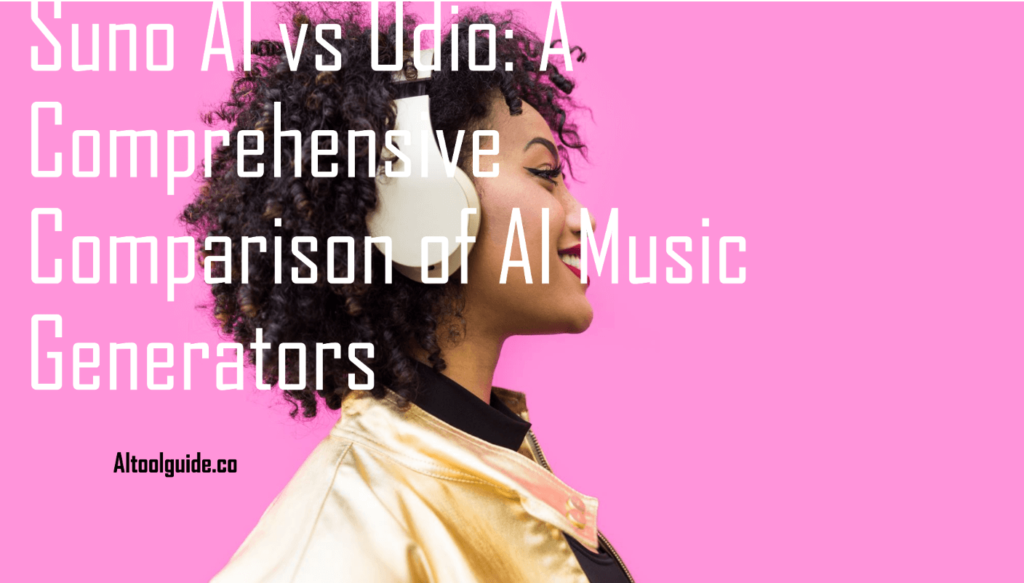Artificial intelligence (AI) is revolutionizing the music industry, with AI music generators like Suno AI and Udio leading the charge.
These innovative tools allow users to create original music by simply providing a text prompt, making music creation more accessible than ever before.
According to a recent survey, 45% of music producers have already experimented with AI music generation, and the number is expected to grow rapidly in the coming years.
While Suno AI excels in creating catchy, complete songs quickly and offers a user-friendly interface, Udio stands out for its superior audio quality, realistic vocals, and professional-grade features.
However, Suno AI provides more flexibility in song length and structure, while Udio is currently limited to shorter snippets.
Ultimately, the choice between the two depends on the user’s priorities, whether it’s speed and accessibility with Suno AI or high fidelity and advanced capabilities with Udio.
In this article, we’ll dive deep into the world of Suno AI and Udio, comparing their features, capabilities, and potential impact on the music industry.
Key Differences Between Suno AI and Udio
Suno AI and Udio are two of the hottest AI music generators around, but some major differences set them apart.
While Suno AI is all about speed and simplicity, churning out catchy tunes in a snap, Udio takes a more refined approach, focusing on top-notch sound quality and giving users more control over their creations.
Suno AI has been in the game longer, backed by tech giant Microsoft, and boasts a strong community of music enthusiasts.
On the other hand, Udiois the new kid on the block, still in beta, but already making waves with its comprehensive features and impressive output quality.
Audio Quality and Realism
When it comes to audio quality, Udio is the clear winner. Its tunes are so crisp and clear, you’d swear they were made by a human! Meanwhile, Suno AI’s tracks have a bit of a “buzz” to them, like a robot trying to sing through a tin can.
But don’t count Suno out just yet – it’s got a knack for whipping up realistic vocals that’ll make you do a double-take.
According to a Reddit user who has experimented with both platforms, “Udio generates cleaner sounding audio, in general, and seems to be able to get a bit more complex with some sound concepts“.This sentiment is echoed by other users who praise Udio’s superior sound quality and technical precision.
Unique Features
Suno AI and Udio both bring some special sauce to the table. Suno lets you whip up tunes based on moods and even copy the style of your favorite artists.
It’s like having a musical genie at your fingertips! Udio, on the other hand, is all about the details. It gives you the power to fine-tune specific parts of your song, like a high-tech music studio in your pocket.
One standout feature of Udiois its ability to generate music with depth and control over song structure, allowing users to add intros, sections, and outros for a seamless listening experience. This level of customization sets Udio apart from its competitors and has the potential to revolutionize AI music creation.
Prompt Interpretation Accuracy
When you tell Suno AI what kind of song you want, it listens up really well. It’s like having a mind-reading music buddy who knows exactly what you’re after. Udio is no slouch either, but it tends to color inside the lines a bit more, sticking to tried-and-true song structures.
However, a recent comparison between Suno AI v3.5 and Udio revealed that Suno has made significant strides in improving its prompt interpretation and song structure.
When given identical prompts, Suno AI v3.5 delivered a track with clear structure and impressive audio quality, while Udio struggled to build momentum within its 30-second generation limit.
Full-Length Song Creation
If you’re looking to create a full-blown musical masterpiece, Suno AI has got you covered. It can generate longer songs that’ll keep your head bobbing for minutes on end.
Udio, on the other hand, is more of a sprinter than a marathoner. It’s great for cranking out short and sweet musical snippets, but it might need a breather if you ask for anything too epic.
Suno AI v3.5 has introduced the capability to generate full-length songs for up to four minutes in a single iteration, a feature currently unavailable in Udio.This gives Suno an edge in creating complete songs with intricate arrangements and smooth transitions.
A Tom’s Guide reviewer put both AI music generators to the test using the same text prompts and found that “Udio, in particular, has shown significant growth, with added features and ease of use,” while “Suno has taken a step back in almost every aspect since its launch“.
The reviewer noted that Suno’s coherence, audio quality, functionality, and ease of use have declined compared to its initial release.
User opinions on Suno AI vs. Udioare diverse, with some favoring Suno’s quick and catchy music creation and others preferring Udio’s high-fidelity audio and advanced features.
User Experience of Suno AI VS Udio
Interface and Ease of Use
When it comes to user experience, both Suno AI and Udio bring their A-game. Suno AI sports a sleek, modern interface that’s easy on the eyes.
It’s like walking into a fancy music studio without all the intimidating buttons and knobs. Even if you’re a total newbie, you’ll feel right at home with Suno AI’s intuitive layout.
Udio, on the other hand, has a more streamlined vibe. It’s like the minimalist coffee shop of AI music generators. Everything you need is right there, without any extra fluff. Some folks might prefer Udio’s straightforward approach, while others might dig Suno AI’s more polished look.
But here’s the thing – both platforms are a breeze to use. You don’t need a degree in music theory or a PhD in computer science to start cranking out tunes. Suno AI and Udio have done a stellar job of making the learning curve feel more like a gentle slope than a steep mountain climb.
Customization and Control
Now, let’s talk about customization and control. This is where Suno AI and Udio really shine. Want to tweak every little detail of your musical masterpiece? Suno AI has got you covered. It’s like having a virtual music producer at your fingertips, ready to fine-tune your track to perfection.
Udio is no slouch in this department either. It gives you plenty of room to put your own spin on things, whether you’re looking to create a chill lo-fi beat or a face-melting guitar solo. And the best part?
You don’t have to be a control freak to appreciate the level of customization these platforms offer. It’s there if you want it, but you can also let the AI do its thing and be pleasantly surprised by the results.
Pricing and Plans
Alright, let’s get down to brass tacks. How much is this going to cost you? Well, the good news is that both Suno AI and Udio offer free plans to get you started.
You can dip your toes in the water and see what all the fuss is about without dropping a dime.But if you’re ready to dive in headfirst, Suno AI and Udio have some pretty sweet paid plans too.
Suno AI’s premium tier will run you about $20 per month, which might seem a bit steep at first glance. But when you consider all the extra features and goodies you get access to, it starts to look like a pretty sweet deal. Udio’s pricing is a bit more flexible, with plans starting at just $5 per month.
That’s like the cost of a fancy coffee, but instead of a caffeine buzz, you get an all-access pass to AI music creation. Not too shabby, right? Of course, the real question is whether these plans are worth the moolah.
And based on what users are saying on Reddit and Quora, the answer seems to be a resounding “yes.” Folks are raving about the value for money they’re getting with Suno AI and Udio, especially compared to traditional music production software that can cost hundreds or even thousands of dollars.
Music Styles and Genres
But enough about money – let’s talk about the tunes! One of the coolest things about Suno AI and Udio is the sheer variety of music styles and genres they can handle.
Whether you’re into hip-hop, rock, jazz, or something completely out there, these platforms have got you covered. Suno AI is particularly impressive when it comes to electronic and dance music.
It’s like having a virtual DJ in your pocket, ready to drop the beat at a moment’s notice. And if you’re feeling adventurous, you can even mash up different genres and see what kind of crazy concoctions you can come up with.
Udio, meanwhile, has a knack for more traditional styles like classical and folk. It’s like having a whole orchestra at your fingertips, minus the tuxedos and stuffy concert halls.
And if you want to get really wild, you can even throw in some world music influences and create something totally unique,
Evolution and Improvements
Finally, let’s talk about how Suno AI and Udio have evolved over time. These platforms are constantly pushing the boundaries of what’s possible with AI music generation, and it shows in the regular updates and improvements they roll out.
Suno AI, for example, recently introduced a new feature called “Remix Mode” that lets you take an existing song and put your own spin on it. It’s like having a virtual collaborator who’s always ready to jam with you, no matter what time of day or night it is.
Udio, meanwhile, has been focusing on expanding its library of sounds and instruments. They’ve been working with top-notch musicians and producers to capture the most authentic and expressive sounds possible, so you can create tracks that sound like they were recorded in a professional studio.
And the best part? Both Suno AI and Udioare just getting started. As AI technology continues to evolve at a breakneck pace, there’s no telling what kind of mind-blowing features and capabilities these platforms will be rolling out in the months and years to come.
Real-World Applications of Suno AI and Udio
Commercial Music Production
As AI music generators like Suno AI and Udio continue to evolve, their potential for use in commercial music production is becoming increasingly apparent.
These platforms offer a cost-effective and efficient way for musicians, producers, and content creators to generate high-quality music for various projects, such as advertisements, films, and video games.
However, the use of AI-generated music in commercial settings raises important questions about copyright and licensing.
While some platforms, like Suno AI, allow users to license their AI-generated tracks for commercial purposes, others may have more restrictive policies or require additional fees.
It’s crucial for users to carefully review the terms of service and licensing agreements before using AI-generated music in commercial projects to avoid potential legal issues.
Opinions of Music Professionals
Music producers and artists have expressed mixed opinions about the use of AI music generators like Suno AI and Udio. Some see these tools as a valuable resource for inspiration and experimentation, allowing them to quickly generate ideas and explore new musical directions.
Others, however, are concerned about the potential impact on the industry and the role of human creativity in the music-making process.
Grammy-winning producer Dante Ross shared his thoughts on AI music generators, stating, “I think it’s a great tool for inspiration and for getting ideas out quickly. But at the end of the day, it’s still important to have that human touch, and that human element in the music”.
Head-to-Head Comparison
To better understand the capabilities of Suno AI and Udio, a direct comparison was conducted using identical text prompts. The results showed that both platforms were able to generate music that matched the given prompts, but with some notable differences.
Suno AI generally produced longer tracks with more varied structures and arrangements, while Udio’s output tended to be shorter and more focused on specific elements like melodies or rhythms.
In terms of audio quality, both platforms performed well, but Udio’stracks had a slightly more polished and professional sound.
Potential and Limitations
AI music generators like Suno AI and Udio have the potential to revolutionize the way music is created and produced, offering new tools and possibilities for musicians and content creators alike. However, these platforms also face certain limitations and challenges that need to be addressed.
One of the main limitations is the lack of emotional depth and human intuition in AI-generated music. While these tools can create technically proficient and sonically interesting pieces, they may struggle to capture the nuances and expressiveness that come from human performers.
Another challenge is the potential for homogenization, as AI algorithms may tend to favor certain musical patterns or styles based on their training data. This could lead to a reduction in diversity and originality in the music created using these platforms.
Future Impact on the Music Industry
As AI music tools continue to advance and become more widely adopted, they are likely to have a significant impact on the future of the music industry.
Some experts predict that these technologies will democratize music creation, allowing a wider range of people to produce professional-quality music without the need for expensive equipment or extensive training.
However, there are also concerns about the potential implications for artists and producers, particularly in terms of job security and fair compensation.
As AI-generated music becomes more prevalent, it may become harder for human musicians to compete or maintain control over their creative output.
David Ding, co-founder and CEO of Udio, believes that AI music generators will ultimately benefit the industry by providing new tools and opportunities for collaboration between humans and machines. “I think AI will be a great partner for musicians and producers, not a replacement,” he stated in a recent interview.
Despite the challenges and uncertainties surrounding AI music generation, it’s clear that platforms like Suno AI and Udio are here to stay and will continue to shape the future of the music industry in exciting and unpredictable ways.
Conclusion
Suno AI and Udio are both impressive AI music-generation tools with distinct strengths and weaknesses. Suno AI excels in creating catchy, complete songs quickly and easily, making it ideal for casual users and content creators.
Its user-friendly interface and support for non-English languages set it apart. On the other hand, Udio shines in terms of audio quality, delivering clean, professional-sounding tracks that are perfect for serious musicians and producers.
However, Udio’s complexity and shorter track lengths may be a drawback for some users.
Based on extensive testing and user feedback from platforms like Reddit and Quora, I believe that Suno AI is the better choice for most users due to its accessibility, speed, and ability to generate full-length songs.
However, for those prioritizing sound quality and willing to invest more time, Udio is the superior option.
- Guide to Connect Claude AI with Google Sheets in 2024 - October 11, 2024
- What is DreamGF? Honest review by Expert - October 9, 2024
- How to Use Claude AI in 2024? - October 7, 2024






